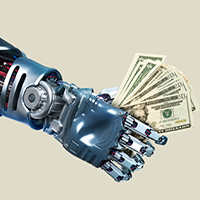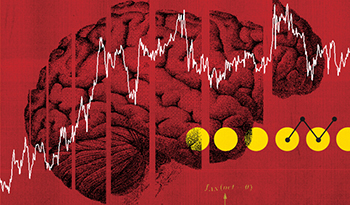 WorldQuant, a quantitative investment management firm founded in 2007 with over 500 employees globally, has been sad using for small-scale trading an artificial intelligence technology called deep learning (also known as deep structured learning, hierarchical learning or deep machine learning) that loosely mimics the neurones in our brains.
WorldQuant, a quantitative investment management firm founded in 2007 with over 500 employees globally, has been sad using for small-scale trading an artificial intelligence technology called deep learning (also known as deep structured learning, hierarchical learning or deep machine learning) that loosely mimics the neurones in our brains.
In fact, our neurones are densely interconnected in complex ways, exchanging signals to other cells and forging new connections as we learn. The power of deep learning comes from a similar non-linear, multi-layered processing of data, which allows computers to build sophisticated concepts from basic ones, by using a cascade of many layers of nonlinear processing units for feature extraction and transformation.
Each successive layer uses the output from the previous layer as input. Higher level features are derived from lower level features to form a hierarchical representation. This is part of the broader machine learning field of learning representations of data, that allows the machine to learn multiple levels of representations that correspond to different levels of abstraction; the levels form a hierarchy of concepts.
Following WorldQuant’s, neural networks could help propel the transformation of finance, threatening old-school investing jobs, but researchers don’t oversell the technology and suggest to consider it as just another potential arrow in their quiver.
Nicolas Chapados, a computer scientist who collaborates with Professor Yoshua Bengio, a pioneer in deep learning, and co-heads quant fund Chapados Couture Capital in Montreal and Element AI, a research firm that uses the technology, claims that the deep learning is just five years away from becoming a mainstream tool at hedge funds.
“There’s a huge class of deep-learning models used in tech firms that can be adapted to financial processing,” sais Chapados.
 Deep learning technology already enables Tesla Inc.’s self-driving cars and Amazon.com Inc.’s Echo, the voice-activated smart speaker and Facebook Inc.’s image recognition, the ability to identify a dog in a photo.
Deep learning technology already enables Tesla Inc.’s self-driving cars and Amazon.com Inc.’s Echo, the voice-activated smart speaker and Facebook Inc.’s image recognition, the ability to identify a dog in a photo.
Deep learning technology needs super-powerful computers and valuable collections of data to do its job: one of the reasons why hedge funds lag in deploying deep learning is because market data is limited and constantly changing, making predictions of events like stock moves more challenging.
Hitoshi Harada, co-founder of Alpaca, a startup that sells deep learning trading platforms to banks and other financial firms explained: “While deep learning techniques can work very well using millions, if not billions, of data points in currency and commodity markets that are correlated with each other, it is challenging to build a good model using only a thousand data points of single-stock daily data” said, citing companies that have publicly traded for only a year as an example.
In the war for talent with tech firms, hedge funds firms don’t just face the shortage of predictable data in some markets. They are also struggling to hire scientists, which has slowed their pursuit of deep learning.
However, technology has advanced sufficiently over recent years to suggest such methods have the potential to improve the elements of the process, and deep learning is an active area of long-term research that is going to be, if not a revolutionary force, surely a useful weapon for hedge funds firms.
